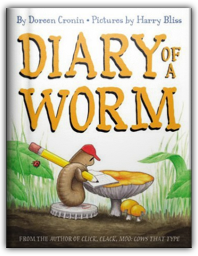
Doreen Cronin (Click, Clack Moo: Cows That Type) and cartoonist Harry Bliss (illustrator of A Fine, Fine School) shed a whole new light on a creature that spends most of its time underground: the earthworm. Written in diary form, this truly hilarious picture book tracks the ins and outs of a worm's life from the perspective of the worm family's young son. Take June 15's entry: "My older sister thinks she's so pretty. I told her that no matter how much time she spends looking in the mirror, her face will always look just like her rear end. Spider thought that was really funny. Mom did not." Except for the fact that he can't chew gum or have a dog, the boy likes being a worm. He never has to go to the dentist ("No cavities—no teeth, either"), he never gets in trouble for tracking mud through the house, and he never has to take a bath. As long as he can remember Mom's rule "Never bother Daddy when he's eating the newspaper," all is well. Bliss's endearing cartoonish illustrations of anthropomorphized worms are clever visual punchlines for Cronin's delightfully deadpan humor. For example, "June 5: Today we made macaroni necklaces in art class" sounds normal enough until you see the worms wearing one piece of macaroni around their necks, taking up a good part of each worm's body. Children and adults alike will adore this worm's eye perspective on the world. (Ages 6 and older) —Karin Snelson 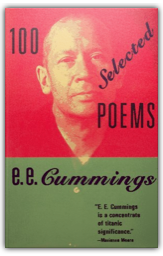
e.e. cummings is without question one of the major poets of this century, and this volume, first published in 1959, is indispensable for every lover of modern lyrical verse. It contains one hundred of cumming's wittiest and most profound poems, harvested from thirty-five of the most radically creative years in contemporary American poetry. These poems exhibit all the extraordinary lyricism, playfulness, technical ingenuity, and compassion for which cummings is famous. They demonstrate beautifully his extrapolations from traditional poetic structures and his departures from them, as well as the unique synthesis of lavish imagery and acute artistic precision that has won him the adulation and respect of critics and poetry lovers everywhere. "e.e. cummings is a concentrate of titanic significance, 'a positive character'; and only ingenuousness could attempt to suggest in a word the 'heroic' aspect of his painting, his poems, and his resistances. He does not make aesthetic mistakes."-Marianne Moore; "To my way of thinking cummings is, within his field of personal emotion, the lyrical field, one of the inventors of our time. He puts his inventions down with an unexpected refurbishing of phrase and a filigree delicacy of hairbreadth exact statement that is a continual challenge."-John Dos Passos; "No one else has ever made avant-garde, experimental poems so attractive both to the general and the special reader; since the early twenties, cummings has been more widely imitated and easily appreciated than any other modernist poet."-Randall Jarrell; "He has more control over language than any poet since Joyce. . . . Everybody delights in reading him."-Karl Shapiro. 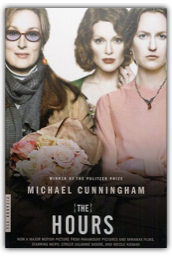
The Hours is both an homage to Virginia Woolf and very much its own creature. Even as Michael Cunningham brings his literary idol back to life, he intertwines her story with those of two more contemporary women. One gray suburban London morning in 1923, Woolf awakens from a dream that will soon lead to Mrs. Dalloway. In the present, on a beautiful June day in Greenwich Village, 52-year-old Clarissa Vaughan is planning a party for her oldest love, a poet dying of AIDS. And in Los Angeles in 1949, Laura Brown, pregnant and unsettled, does her best to prepare for her husband's birthday, but can't seem to stop reading Woolf. These women's lives are linked both by the 1925 novel and by the few precious moments of possibility each keeps returning to. Clarissa is to eventually realize:There's just this for consolation: an hour here or there when our lives seem, against all odds and expectations, to burst open and give us everything we've ever imagined.... Still, we cherish the city, the morning; we hope, more than anything, for more. As Cunningham moves between the three women, his transitions are seamless. One early chapter ends with Woolf picking up her pen and composing her first sentence, "Mrs. Dalloway said she would buy the flowers herself." The next begins with Laura rejoicing over that line and the fictional universe she is about to enter. Clarissa's day, on the other hand, is a mirror of Mrs. Dalloway's—with, however, an appropriate degree of modern beveling as Cunningham updates and elaborates his source of inspiration. Clarissa knows that her desire to give her friend the perfect party may seem trivial to many. Yet it seems better to her than shutting down in the face of disaster and despair. Like its literary inspiration, The Hours is a hymn to consciousness and the beauties and losses it perceives. It is also a reminder that, as Cunningham again and again makes us realize, art belongs to far more than just "the world of objects." —Kerry Fried 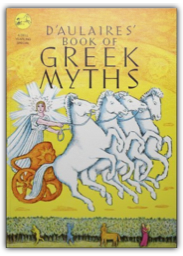
No education is complete without a large slice of Greek mythology. And there's no better way of meeting that literary quota than with the D'Aulaires' book. All the great gods and goddesses of ancient Greece are depicted in this big, beautiful classic, lovingly illustrated and skillfully told. Young readers will be dazzled by mighty Zeus, lord of the universe; stirred by elegant Athena, goddess of wisdom; intimidated by powerful Hera, queen of Olympus; and chilled by moody Poseidon, ruler of the sea. These often impetuous immortals flounce and frolic, get indiscreet, and get even. From petty squabbles to heroic deeds, their actions cover the range of godly—and mortal—personalities. 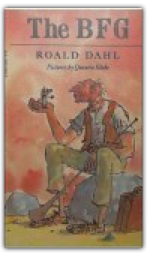
Evidently not even Roald Dahl could resist the acronym craze of the early eighties. BFG? Bellowing ferret-faced golfer? Backstabbing fairy godmother? Oh, oh ... Big Friendly Giant! This BFG doesn't seem all that F at first as he creeps down a London street, snatches little Sophie out of her bed, and bounds away with her to giant land. And he's not really all that B when compared with his evil, carnivorous brethren, who bully him for being such an oddball runt. After all, he eats only disgusting snozzcumbers, and while the other Gs are snacking on little boys and girls, he's blowing happy dreams in through their windows. What kind of way is that for a G to behave? 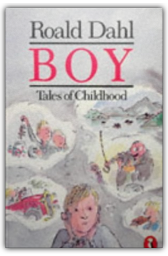
Filled with excitement, humor, and the unexpected, this entertaining collection of tales—inspired by Roald Dahl's remarkable childhood—are stories that are not easily forgotten. |
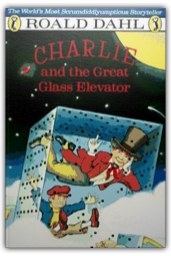
Picking right up where Charlie and the Chocolate Factory left off, Charlie and the Great Glass Elevator continues the adventures of Charlie Bucket, his family, and Willy Wonka, the eccentric candy maker. As the book begins, our heroes are shooting into the sky in a glass elevator, headed for destinations unknown. What follows is exactly the kind of high-spirited magical madness and mayhem we've all come to expect from Willy Wonka and his creator Roald Dahl. The American space race gets a send-up, as does the President, and Charlie's family gets a second chance at childhood. Throw in the Vermicious Knids, Gnoolies, and Minusland and we once again witness pure genius. (Ages 9 to 12) 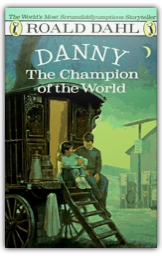
"My father, without the slightest doubt, was the most marvelous and exciting father any boy ever had." Danny feels very lucky. He adores his life with his father, living in a gypsy caravan, listening to his stories, tending their gas station, puttering around the workshop, and occasionally taking off to fly home-built gas balloons and kites. His father has raised him on his own, ever since Danny's mother died when he was four months old. Life is peaceful and wonderful... until he turns 9 and discovers his father's one vice. Soon Danny finds himself the mastermind behind the most incredible plot ever attempted against nasty Victor Hazell, a wealthy landowner with a bad attitude. Can they pull it off? If so, Danny will truly be the champion of the world. Danny is right up to Roald Dahl's impishly brilliant standards. An intense and beautiful father-son relationship is balanced with sublegal high jinks that will have even the most rigid law-abider rooting them on. Dahl's inimitable way with words leaves the reader simultaneously satisfied and itching for more. (Ages 9 to 13) —Emilie Coulter 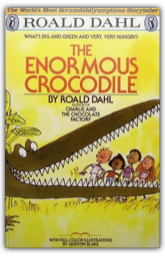
With his "secret plans and clever tricks," the Enormous Crocodile desires to lunch not with but on a nice, juicy child. His croc companion, the Notsobig One, is the first to try to talk him out of his scheme, claiming children are no good to eat. "'Tough and chewy!' cried the Enormous Crocodile. 'Nasty and bitter! What awful tommyrot you talk! They are juicy and yummy!'" One jungle critter after another—from Trunky the elephant to Muggle-Wump the monkey to the Roly-Poly Bird—tries to prevent the Enormous Crocodile from carrying out his dastardly deed, but on he waddles toward the village. Unfortunately for him, the animals have a few secret plans and clever tricks up their furry sleeves, too! 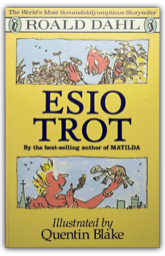
Mr Hoppy loves Miss Silver, who loves only Alfie, her pet tortoise, until Mr Hoppy discovers an ancient spell calling for one hundred and forty tortoises. By the author of Charlie and the Chocolate Factory. Reprint. 50,000 first printing. PW. C. 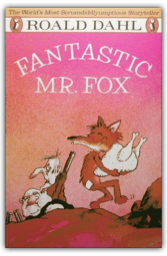
In the tradition of The Adventures of Peter Rabbit, this is a "garden tale" of farmer versus vermin, or vice versa. The farmers in this case are a vaguely criminal team of three stooges: "Boggis and Bunce and Bean / One fat, one short, one lean. / These horrible crooks / So different in looks / Were nonetheless equally mean." Whatever their prowess as poultry farmers, within these pages their sole objective is the extermination of our hero—the noble, the clever, the Fantastic Mr. Fox. Our loyalties are defined from the start; after all, how could you cheer for a man named Bunce who eats his doughnuts stuffed with mashed goose livers? As one might expect, the farmers in this story come out smelling like ... well, what farmers occasionally do smell like. 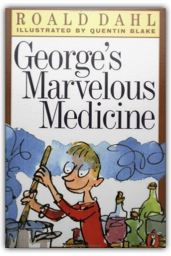
George's grouchy grandma needs a taste of her own medicine—and George knows just the right ingredients to put into it! Roald Dahl is one of the most beloved storytellers of all time, and his books have been children's favorites for generations. Puffin is proud to offer a strong new look for nine of our classic Roald Dahl titles. The distinctive cover treatment, with new art by Quentin Blake, will make these books easily recognizable. In addition, Quentin Blake's funny, quirky illustrations now appear in all of the books. So turn the page and you'll be sure to have a Dahl-ectable summer! 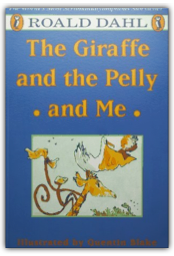
While Billy and the Ladderless Window-Cleaning Company are cleaning the windows of the Duke of Hampshire's estate, they spot the Cobra, the most dangerous cat burglar in the world, stealing the Duchess's diamonds. Reissue. H. |

My Library
Collection Total:
1390 Items
1390 Items
Last Updated:
Mar 22, 2009
Mar 22, 2009
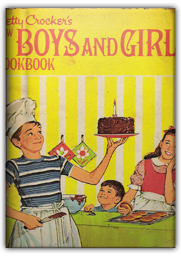

 Made with Delicious Library
Made with Delicious Library